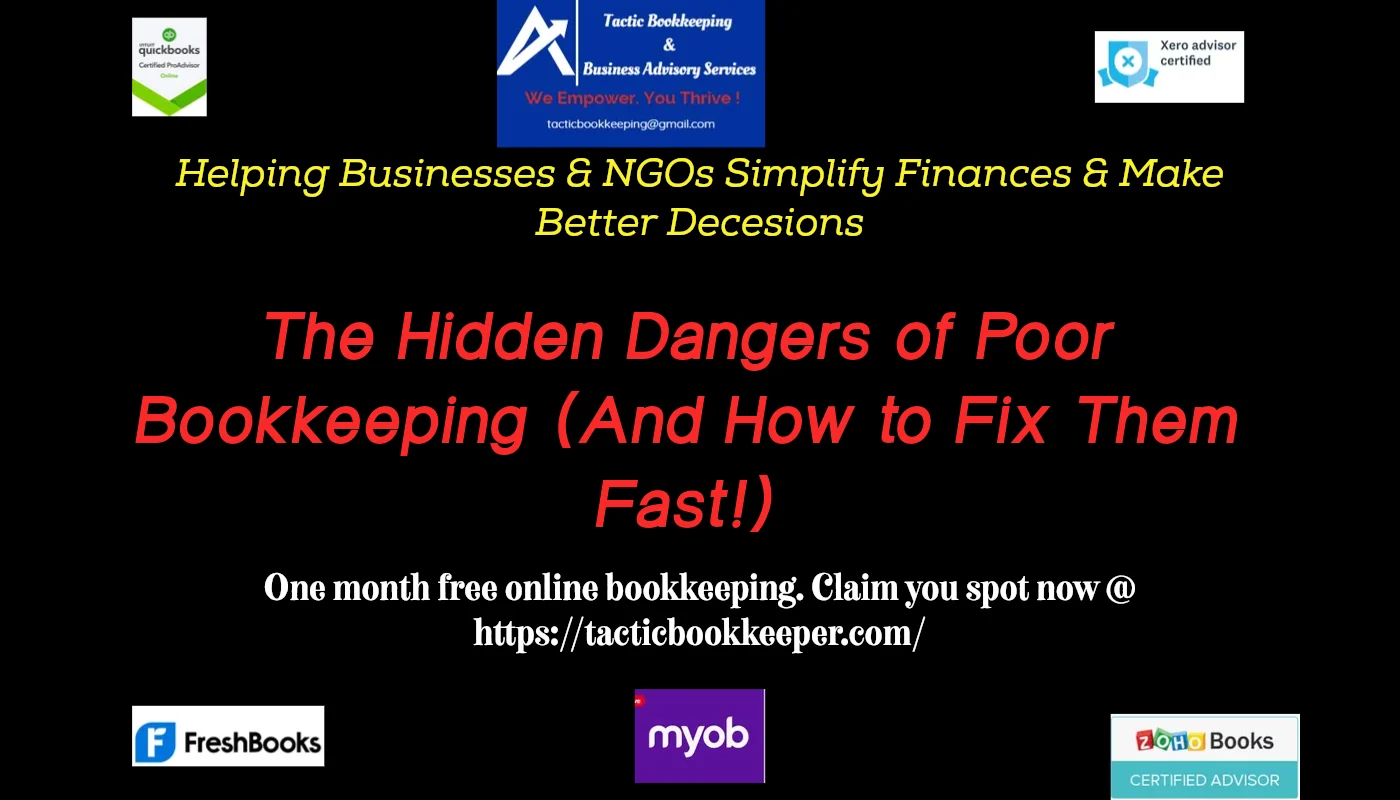Are You Losing Money Without Realizing It?
Imagine waking up to a tax audit notice or realizing you’ve overpaid thousands in taxes—just because of sloppy bookkeeping. Scary, right? Unfortunately, this happens more often than you think.
For small business owners, freelancers, and entrepreneurs, bookkeeping might seem like an administrative chore. But here’s the harsh reality: poor bookkeeping isn’t just an inconvenience—it’s a silent business killer. It leads to lost profits, tax penalties, cash flow nightmares, and even business failure.
Your competitors are already optimizing their finances. Are you keeping up, or are you falling behind? Let’s uncover the hidden costs of poor bookkeeping and, more importantly, how to fix it before it’s too late.
The True Cost of Poor Bookkeeping
1. Lost Revenue & Missed Opportunities
If your books are disorganized, you’re likely losing money in ways you don’t even realize.
❌ Unbilled Work – Forgetting to invoice clients means working for free.
❌ Missed Deductions – Poor expense tracking means overpaying on taxes.
❌ Overestimated Cash Flow – Thinking you have more money than you do can lead to overspending.
Case Study:
Emma, a freelance graphic designer, realized she had forgotten to invoice a client for a $3,500 project—three months after completion! By implementing automated invoicing, she never missed a payment again.
Fix It Fast: Use invoicing tools like QuickBooks or FreshBooks to track payments automatically.
2. Tax Penalties & Nightmares
The tax authorities doesn’t care if your bookkeeping is a mess. If you file late, underreport income, or miscalculate deductions, you’ll face hefty penalties.
The Risks:
- Late tax filings = penalties + interest fees
- Incorrect deductions = red flags for an audit
- Poor record-keeping = missed tax refunds
Real-Life Example:
A small business owner misclassified expenses and underreported revenue. Result? A tax audit and a $10,000 fine.
Fix It Fast: Keep organized financial records and work with a bookkeeper to ensure accurate tax filings.
3. Cash Flow Crisis & Business Instability
Your books should help you make smart business decisions. If they’re inaccurate, you’re flying blind.
🔴 Scaling Too Quickly: Hiring staff or expanding before your finances are stable.
🔴 Overspending on Non-Essentials: Without proper tracking, you may not see where you’re bleeding money.
🔴 Loan Rejections: Banks require clean financial records for approvals.
Example:
A coffee shop owner expanded to a second location without realizing that cash flow wasn’t strong enough. Within six months, both locations struggled, leading to financial disaster.
Fix It Fast: Review financial reports monthly and forecast cash flow quarterly.
4. Payroll & Vendor Payment Disasters
Employees and vendors expect to be paid on time. Poor bookkeeping can destroy relationships.
Common Issues:
- Late payroll = unhappy employees & potential lawsuits
- Missed vendor payments = damaged credit & supply chain problems
- Incorrect tax withholdings = IRS fines
Illustration:
A digital marketing agency forgot to pay a key freelancer on time. The freelancer stopped working with them, delaying a major client project.
Fix It Fast: Use automated payroll systems like Gusto or ADP to avoid payment mistakes.
How to Fix Poor Bookkeeping (Before It’s Too Late!)
1. Get Organized Today
Start with the basics:
✔ Go Paperless – Use tools like Dext to store receipts digitally.
✔ Separate Finances – Have a dedicated business bank account.
✔ Set a Routine – Review your books weekly to stay on top of your numbers.
2. Automate Your Bookkeeping
Top Automation Tools:
QuickBooks/Xero – For real-time financial tracking
Expensify – To manage expenses
Bill.com – To automate bill payments
Businesses that automate their finances save 10+ hours per week—while those that don’t are stuck in financial chaos.
3. Hire a Professional (Before It’s Too Late!)
If bookkeeping isn’t your strength, outsource it before it costs you more.
Why You Need a Pro:
- Saves time so you can focus on business growth
- Avoids costly mistakes that lead to tax penalties
- Provides financial clarity to make better decisions
Did You Know?
Businesses with professional bookkeeping services grow 31% faster than those without!
Fix It Fast: Book a Free Consultation with Tactic Bookkeeping and get your finances under control today.
4. Conduct Regular Financial Reviews
How Often Should You Review Your Books?
✔ Weekly: Track expenses and invoices
✔ Monthly: Review profit & loss statements
✔ Quarterly: Tax planning with a CPA
✔ Annually: Business budget planning
5. Keep Learning & Improving
Stay Financially Savvy:
- Take online courses (Udemy, Coursera)
- Subscribe to finance blogs & podcasts
- Join business communities for financial tips
Frequently Asked Questions (FAQs)
1. What are the most common bookkeeping mistakes?
Mixing personal and business expenses, failing to track receipts, missing invoices, and not reconciling accounts regularly.
2. Can bad bookkeeping really cause my business to fail?
Yes! It leads to cash flow issues, tax fines, and poor financial decisions, all of which can cause business failure.
3. What’s the best bookkeeping software for small businesses?
Popular options include QuickBooks, Xero, FreshBooks, and Wave.
4. When should I hire a bookkeeper?
If you’re spending too much time on finances, missing tax deductions, or facing cash flow confusion, it’s time to hire a pro.
5. How can I fix my bookkeeping right now?
Start by organizing records, automating finances, and contacting a bookkeeping expert for a free consultation.
Final Thoughts: Don’t Let Poor Bookkeeping Ruin Your Business
The cost of poor bookkeeping is too high to ignore. The good news? You can fix it—starting today.
Here’s What You Should Do Right Now:
Step 1: Organize your finances & automate bookkeeping
Step 2: Conduct regular financial reviews
Step 3: Get expert help before it’s too late
Don’t Wait Until Tax Season Panic Hits!
Book a FREE consultation with Tactic Bookkeeping and take control of your finances today.
Subscribe to our daily newsletter for bookkeeping tips, tax-saving strategies, and exclusive financial hacks.
What’s your biggest bookkeeping challenge? Drop a comment below! We’d love to hear from you!

